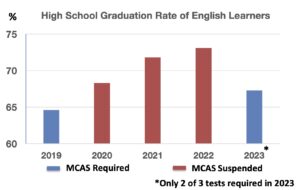Save Thursday, September 19 at 7pm and join us for the first of three virtual sessions exploring multilingual education in Massachusetts.
The goals of this series are to:
- Understand the current Massachusetts political and policy landscape for multilingual learners (MLL) and the resulting challenges facing them
- Learn about effective programming for MLLs that uphold their native languages and cultures, while learning academics and English
- Discuss the challenges of (re)building a robust bilingual educator pipeline and promising practices.
Sessions
- Session 1 on September 19 at 7pm will be “Understanding the political landscape and the multilingual parent and student experience.”
- Session 2 on October 24 at 7pm will be “What makes an effective bilingual program?”
- And Session 3 on November 12 at 7pm will be “Building the Bilingual Educator Pipeline.”
Our speakers will share their deep knowledge and experience about the current Massachusetts policy landscape and challenges for multilingual learners and their families. → Read More






